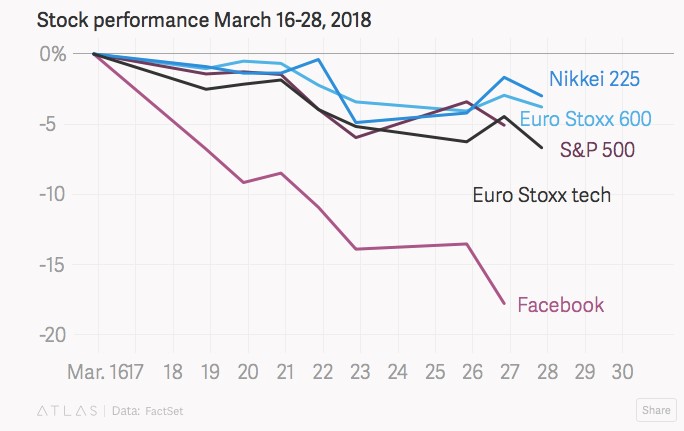Global tech stocks are already losing big in a massive sell-off as the first unintended consequence of Trump’s trade war with China, and it’s about to get much worse—especially for America’s strategic chip-makers.
Semiconductor stocks have been on a roll—until the trade war hijacked their explosive move upwards.
Even as recently as March 12, analysts were sharpening their bull horns and readying for an even bigger rally:

(Click to enlarge)
The bullishness is based on a major shift in technology towards artificial intelligence and … well, the Internet of Everything.
But the ensuing days saw tech stocks nose-dive:

(Click to enlarge)
Those who remain bullish despite the massive losses note that the U.S. semiconductor sector is still trading at 20.6 times earnings—but that in itself is a problem.
Sentiment will be divided over how investors begin to view the consequences of Trump’s $50-billion package of tariffs for a yet-to-be-specified list of items and his talk of banning Chinese investment in U.S. tech. In other words, sentiment will be driven by analysis of what this trade war is going to hurt more: American tech or Chinese tech.
In its retaliation, China could target not only U.S. agriculture, aircraft, automobiles and services—but it might target semiconductors.
There are 4 reasons this might hurt U.S. chip-makers more than China:
#1 America’s Chip segment is getting crowded
Banning Chinese investment in U.S. technology could end up being a worse problem for American chipmakers than for its Chinese counterparts.
Trump is considering the reinstitution of a 40-year-old law called the International Emergency Economic Powers Act, which allows the president to declare a national emergency in the face of an "unusual and extraordinary threat."
Semiconductors will be a key target as it’s already viewed as a ‘strategic’ sector that the U.S. would like to continue to lead globally. Related: Trump Targets Amazon As Tech-Sell Off Continues
The problem is this, as laid out in Bloomberg: Because it’s a crowded space, the next phase is going to be highly competitive. Investors want to see more and the Trump ban will remove one of only three options semiconductor players will have to maintain the lure for investors. They can work on stronger earnings; they can buy back large volumes of shares, but their ability to make themselves acquisition targets will be severely limited.
#2 China Is Refocusing on Its Own, Homegrown Unicorns
The timing of the potential Trump tech ban—and the $50-billion tariff package—isn’t great from the American tech standpoint. The overall sentiment is that China was already slowing big foreign acquisitions.
Put another way, it’s already stolen enough intellectual property to switch focus to a homegrown tech sector. Now, it’s trying to get its Chinese firms that listed in the U.S. to come home and it’s working hard to make that an attractive prospect.
#3 Chinese Tech Firms are Ready to Go Public—Fast
China only has 59 semiconductor firms listed, so right now we’re about to see a major push to go public, and the government is going to make sure that they do it quickly.
China have been on IPO fire:
Last year, Greater China (mainland China, Hong Kong, Macau, Taiwan) issued US$49 billion in IPO proceeds, which represents one-quarter of the global total.
Now it’s tech’s turn.
“Tech companies in China have developed rapidly in recent years, benefiting from various [government] initiatives, such as ‘13th Five Year Plan,’ ‘Internet Plus,’ and ‘Made in China 2025,” Paul Lau, partner and head of capital markets at consulting firm KPMG China, told Tech in Asia.
“Recently, we’re witnessing high levels of oversubscriptions for IPOs from the ‘new economy’ sector. This reflects the market’s confidence in China’s increasing efforts towards innovation and technology,” he said.
#4 China Will Retaliate
Beijing is balancing carrots and sticks at this point, extending offers and threats simultaneously.
On Monday, China reportedly offered to buy more U.S. micro-chips, according to The Financial Times, as well as to improve rules that allow foreign firms to acquire majority stakes in Chinese securities firms.
But if these offers don’t move Trump, Beijing will opt for retaliation.
CNBC cites a source in the U.S. semiconductor industry as saying that American companies have more than a 50-percent share of China’s chip market but that this doesn’t show up in the export data because a lot of goes offshore for “low-value-added processing”.
That’s a huge market share to subject to Chinese tariffs…
By Charles Benavidez for Safehaven.com
More Top Reads From Safehaven.com:
















